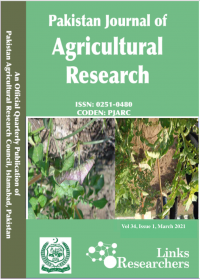1Social Sciences Research Institute, National Agricultural Research Centre, Islamabad, Pakistan; 2Department of Mathematics & Statistics, PMAS Arid Agriculture University, Rawalpindi; 3Social Sciences Research Institute, NARC,Islamabad; 4Institute of Business & Management Sciences, The University of Agriculture, Peshawar, Pakistan.
ABSTRACT
The main focus of this study was to forecast area and production of potato crop in Pakistan using the best fitted model. Time series data of potato area and production in Pakistan from 1980-81 to 2012-13 (33 years) were used. Five different forecasting models such as Linear trend model, Quadratic trend model, Exponential growth model, S-curve trend model and double exponential smoothing model were used to find the best fitted model for area and production of potato in Pakistan. Forecasting errors namely mean absolute percentage error (MAPE), mean absolute deviation (MAD) and mean squared deviation (MSD) were used as model selection criteria. Lowest values of these errors indicated a best fitting model. The study showed that exponential growth model was appropriate for forecasting potato area and production in Pakistan due to lowest values of the forecasting errors. The forecasted values of both area and production of potato crop depicted increasing trend. The findings of this study would help the decision makers to make better policies regarding crop production, price structure as well as consumption of potato in the country.
To share on other social networks, click on any
share button. What are these?






